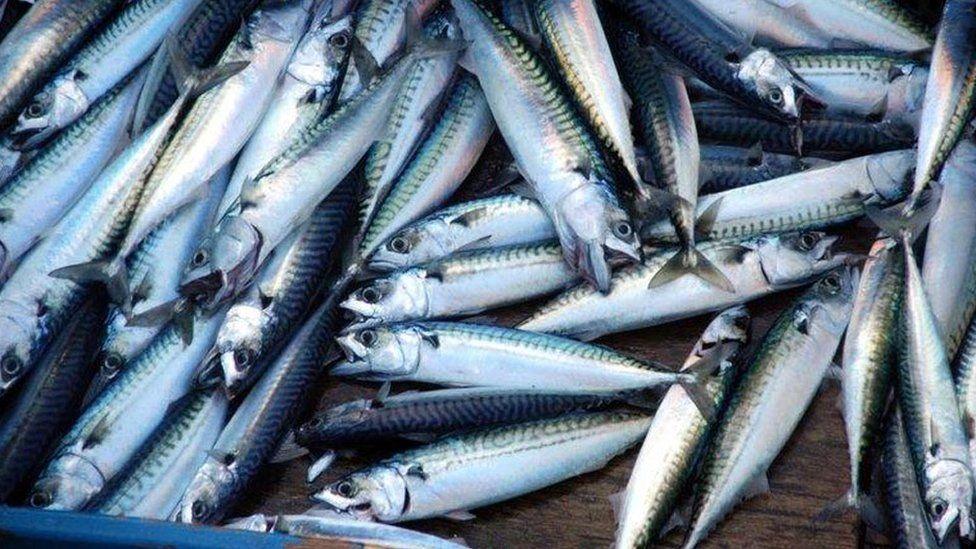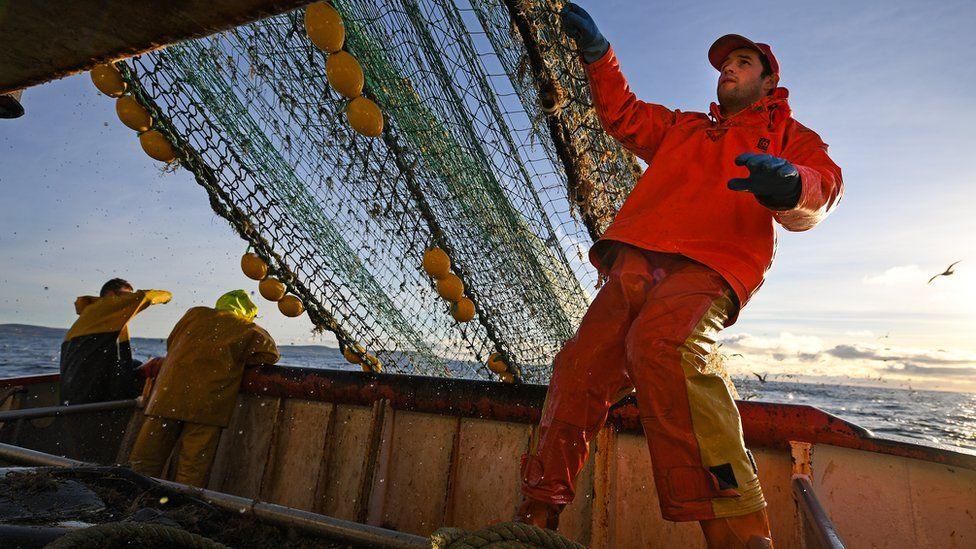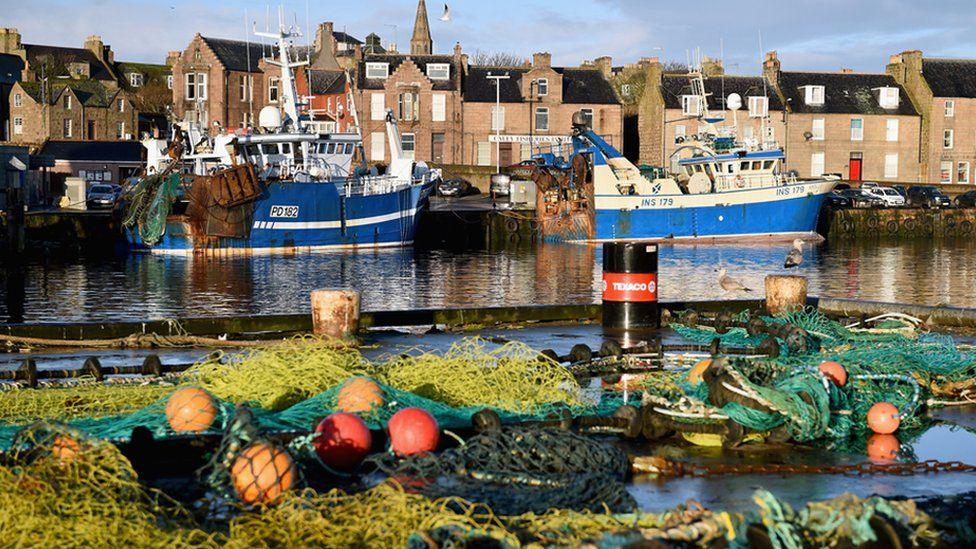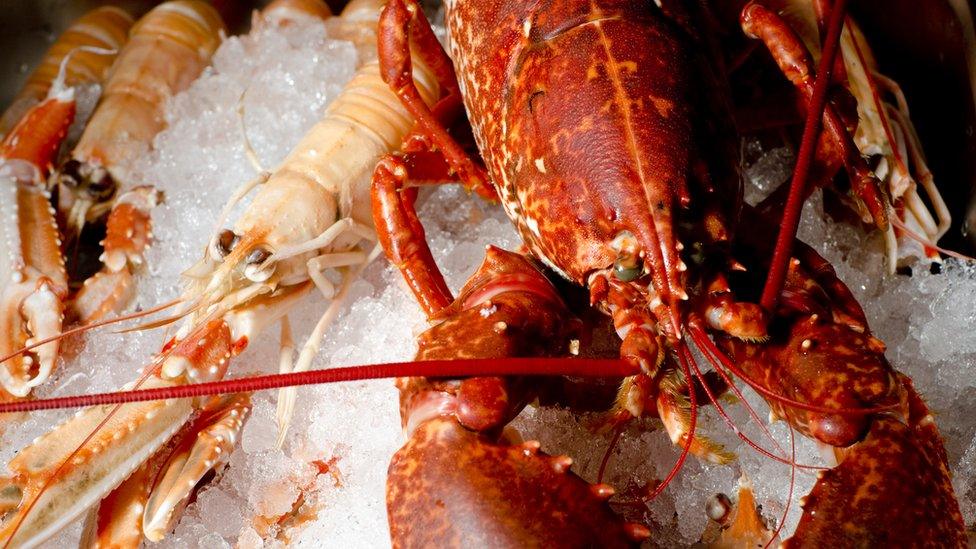Brexit: If the boat comes in
- Published

The end of the Brexit end game has shifted the focus back onto fisheries. Despite playing a relatively small part in the economy, its role when Britain joined the European Common Market made it the most totemic of industries for Brexiteers.
Negotiations have focussed on what percentage of tonnage EU boats catch in UK waters, and how many years it will take to taper to that level - putting tension on Europe's negotiating unity.
Other sectors of the seafood industry have more of an interest in tariff-free and swift access to European markets, and that has given Michel Barnier's team more leverage in the Brexit talks.
There is progress, we're assured. The glacial movement of Brexit talks may, at last, be edging towards the end of the end game.
"We are really in a crucial moment," said EU lead negotiator Michel Barnier, as he went to brief 27 ambassadors on Tuesday. "We are giving it a final push."
The remaining problem? Fish, mainly. There are other, smaller issues according to Tony Connelly, European editor of Irish broadcaster RTE. (Credit to him and other Irish journalists, whose contacts on the leakier EU side of the negotiations have been illuminating.)
Those lesser issues, we're told, include the extent to which the UK can import Asian batteries, a vital component of the low-carbon future. In the jargon, this is about "rules of origin". Expect to hear more about that.

I'm told that some Scottish companies selling food into Northern Ireland were astonished and alarmed this month to have been asked by retail giants to provide "rules of origin" data on their ingredients.
This means sending one's produce to an EU-certified laboratory, to analyse its composition, and at some cost. If there are to be tariffs, and if Northern Ireland is to be inside the European single market, retailers have been told they may have to pay tariffs on the percentage of a Scots-made snack that has some chocolate and coconut ingredients from outside the EU.
Back to Tony Connelly's insights of the lesser matters to be resolved in this 2,000 page document. (Yes, 2000 pages.) He reports the Erasmus student exchange programme is still in play, and there's insistence from the EU that the UK cannot discriminate between different EU nationalities in issuing short-term visas. No favouritism allowed for the Dutch over the Bulgarians.
This suggests that enough has been achieved on the long-running impasse over securing and policing a level playing field, ensuring neither side undermines the other by cutting back on the environmental, social and labour standards that add cost to business.
'Expendable'
And with that, attention has turned once more to fish. Its importance has long been a puzzle to those who measure economics by Gross Domestic Product. The industry counts for around a tenth of one per cent of UK output. Fishing, without processing, accounts for 0.2% of Scottish GDP, employing 4,800 people.
You might think such a small sector would be expendable when set against the competing weight of car manufacturing, finance, aerospace and food - all of them facing a significant hit if no deal is struck on Brexit.
But the word "expendable" is part of the problem. It was used in an internal Whitehall memo in the early 1970s, when Britain was negotiating its way into the European Economic Community. Coming to light long after accession, it was a powerful reminder that fishing was judged a sacrifice that would have to be made for the good of the rest of the economy.
What followed was devastating for the industry, in the loss of jobs and boats at sea. Under the Common Fisheries Policy, foreign vessels took a large share of the tonnage caught in UK waters.
And so it became a totem for the Eurosceptics: the CFP could be blamed for the industry's ills. The fleets out of north-east Scotland and Cornwall were heavily in favour of Brexit. The industry is focussed on coastal communities, and important to their self-image and pride. Speaking out for them and against the CFP, as Alex Salmond and the SNP did in the days when the party was pegged back to north-east Scotland, paid political dividends.
That story misses out large parts of the whole picture. While the CFP had a role to play in painful change for the industry, it was in the context of an industry becoming more efficient, investing in new vessels, requiring fewer crew. There was over-fishing and stocks in danger, such that large cuts in catch quotas forced the scrapping of many boats, while others were tied up for months of the year.
While other countries saw the industry consolidated into powerful corporates, the UK fleet has remained more about skippers with helpful bank managers. And quota has been sold, so European fishery businesses could buy the right to fish, enriching some in Britain.
Those still in the deep sea end of the industry have not been doing badly. By 2017, the added value per head in Scotland had reached £66,000 - doubling in less than a decade, after an extensive scrappage scheme saw rivals for the replenishing stocks taken out of the water.
Creel economy
But that's only part of the industry. It's more diverse than that, including big ships hunting down herring and mackerel shoals for only a few lucrative weeks a year. There are small inshore fisheries and creel boats, less concerned with CFP quota and more with getting their lobsters, langoustine and velvet crabs swiftly across the English Channel to Boulogne and Barcelona.
There are also processors of fish landed by UK or foreign boats, and imported from Iceland or Norway, who want to be sure that around £1bn of annual exports into the European Union can be sustained.

With that profile, the shark's share of UK tonnage caught by EU boats has become one of few negotiating levers of advantage to the UK. It has something that Brexit secures for it, and it can negotiate access in exchange for other elements of access to the EU market.
The EU side has used the reverse argument, explicitly so in the fast few days - that if Britain chooses to keep all its catch for its own boats, then it won't get easy access to the markets where the catch can be sold. And as that catch includes species that are not to British taste, including mackerel and herring, then selling them in chippies and canteens would require a re-education of the British palate.
In 2018, the UK exported £1.34bn-worth of seafood to the European Union, while importing fish and shellfish worth £1.2 billion from other members of the trading block.
Blockade
From leaks out of the latter stages of negotiation, the gap has been between a British tapering of the EU's catch quotas over three years, then to be followed by annual negotiations, set against an EU demand for as much as 10 years, more recently falling to six.
The other figure to be negotiated is the cut in the share that EU boats can catch. The EU offered less than 20%, raising that to 25%. The most recent leaks, appearing in the Financial Times and RTE, point to a compromise point of cutting EU landings by about 35%.
This appears to have put more strain on European unity than anything in the past three-and-a-half years since the Brexit referendum. This would be a difficult deal to sell to coastal communities in Belgium, the Netherlands, Spain and especially France, where a looming presidential ballot makes this electorally sensitive.
Blocking trucks at the English Channel, due to the outbreak of a new variant of Covid-19 has served as a pre-warning of how vulnerable that link and relationship are to disruption by disgruntled French workers.
- Published21 December 2020
